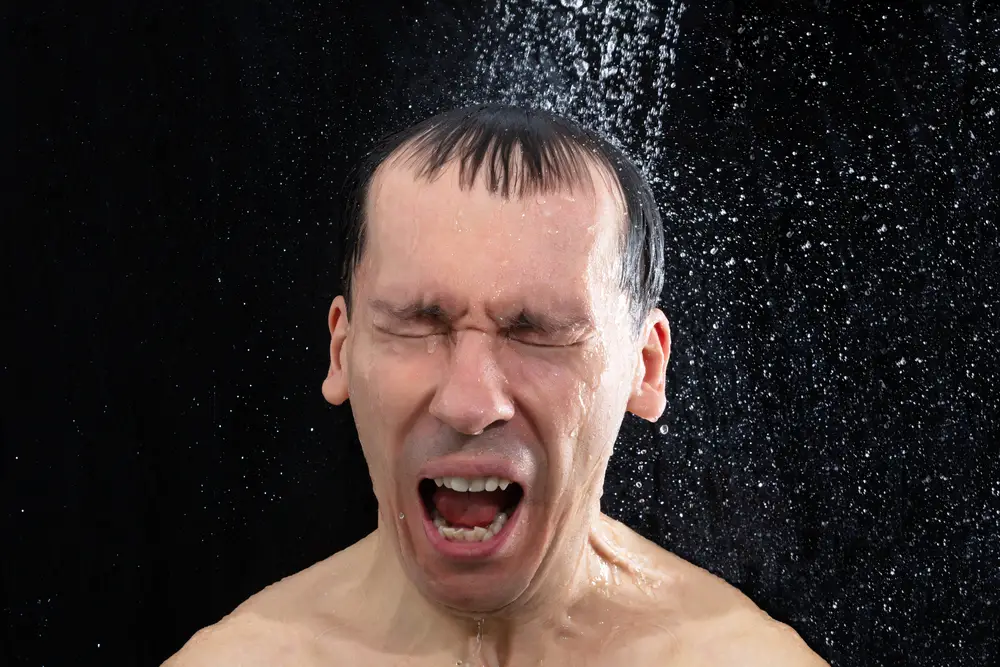If you’ve ever stepped into the shower on a cold morning only to be met with icy water, you may have wondered why your shower water is cold in the morning.
There are several potential reasons for this frustrating problem, from plumbing issues to hot water heater malfunctions.
In this article, we’ll explore some of the most common causes of cold morning showers and offer some tips on how to fix them.
Key Takeaways
- Your shower water temperature is controlled by your water heater, which heats and stores the water until you turn on the faucet.
- Cold or lukewarm water in the morning could be due to the water sitting in the pipes overnight or a malfunctioning thermostat or heating element.
- Understanding the basics of shower water temperature and the common reasons for cold shower water can help you identify the problem and find the best solution.
Understanding the Basics of Shower Water Temperature

1. Cold Shower vs Warm Shower
Have you ever stepped into the shower only to be greeted with a blast of cold water?
Or maybe the water starts off warm but quickly turns cold? Understanding the basics of shower water temperature can help you avoid these unpleasant experiences.
When you turn on the shower, water from the cold water supply enters the shower valve and mixes with hot water from your water heater.
The temperature of the water that comes out of the showerhead is determined by the ratio of hot to cold water.
2. The Role of the Water Heater
Your water heater plays a crucial role in providing hot water for your shower.
The thermostat on your water heater maintains the temperature of the water in the tank.
When you turn on the hot water in your shower, the hot water from the tank is mixed with cold water to achieve the desired temperature.
If you’re experiencing cold water in your shower, it could be due to a problem with your water heater.
For example, if your water heater is too small for your household’s needs, you may run out of hot water quickly. Alternatively, if your water heater is malfunctioning, it may not be able to maintain the desired temperature.
3. Temperature Adjustment Mechanisms
There are several mechanisms that allow you to adjust the temperature of your shower.
The shower valve controls the flow of water from the hot and cold water supplies, allowing you to adjust the ratio of hot to cold water.
Some shower valves have a single handle that controls both the volume and temperature of the water, while others have separate handles for volume and temperature control.
The thermostat on your water heater also plays a role in the temperature of your shower water. If the thermostat is set too low, you may not have enough hot water for your needs. On the other hand, if the thermostat is set too high, you risk scalding yourself.
THREE Common Reasons for Cold Shower Water

If you have ever experienced a cold shower in the morning, you know how unpleasant it can be.
There are several reasons why your shower water may be cold, and it’s important to understand them to find a solution.
1. Issues with the Water Heater
One common reason for cold shower water is a problem with the water heater.
If your water heater is not functioning correctly, it may not be able to provide enough hot water for your shower.
This can be caused by a malfunctioning thermostat, a faulty heating element, or a tank that is too small for your household’s needs.
To determine if your water heater is the problem, check the temperature setting on the thermostat.
If it is set too low, adjust it to a higher temperature. If the tank is too small, consider upgrading to a larger hot water heater. If the heating element is faulty, it may need to be replaced.
2. Problems with the Thermostat
Another reason for cold shower water is a problem with the thermostat. If the thermostat is not working correctly, it may not be able to regulate the temperature of the water properly. This can result in water that is too cold or too hot.
To fix this issue, check the thermostat and make sure it is set to the correct temperature. If it is not, adjust it accordingly. If the thermostat is not functioning correctly, it may need to be replaced.
3. Pipe-Related Complications
Finally, pipe-related complications can also cause cold shower water. If the pipes leading to your shower are old or damaged, they may not be able to handle the flow of hot water. This can cause the water to cool down before it reaches your showerhead.
To fix this issue, check the pipes leading to your shower and make sure they are in good condition.
If they are not, they may need to be replaced. Additionally, make sure that the pipes leading to your hot water heater are properly insulated. This can help prevent heat loss and ensure that hot water reaches your shower.
Professional vs Amateur DIY Shower Water Fixes
If you’re experiencing cold shower water in the morning, you may be wondering if you should call a professional or attempt to fix the issue yourself. Here are some things to consider before making a decision.
1. When to Call a Professional
If you’re not comfortable working with plumbing or don’t have the necessary tools, it’s best to call a professional plumber.
They have the expertise and experience to diagnose and fix the problem quickly and efficiently. Additionally, if your water heater is still under warranty, attempting to fix it yourself could void the warranty.
Another reason to call a professional is if you suspect that your water heater needs to be replaced.
A plumber can help you determine if this is the case and can recommend a new water heater that meets your needs and budget.
2. DIY Solutions
If you’re comfortable working with plumbing and have some basic tools, there are a few things you can try before calling a professional. Here are some DIY solutions to consider:
| Tips | Explanation |
|---|---|
| Check the thermostat | If your water heater’s thermostat is set too low, it could be causing your water to be too cold. Check the thermostat and adjust it if necessary. |
| Inspect the heating element | If the heating element in your water heater is faulty, it could be causing your water to be too cold. You can inspect the heating element and replace it if necessary. |
| Flush the tank | Over time, sediment can build up in your water heater’s tank, which can affect its performance. Flushing the tank can help remove the sediment and improve your water heater’s efficiency. Sediment buildup can also cause your water heater to make strange noises. |
While these DIY solutions can be effective, it’s important to proceed with caution. If you’re not sure what you’re doing, it’s best to call a professional plumber to avoid causing further damage.
Conclusion
In summary, there are several reasons why your shower water may be cold in the morning. By identifying the cause and taking appropriate action, you can ensure that you always have access to hot water when you need it. Remember to consult with a licensed plumber if you are unsure of the cause or how to fix the issue.

